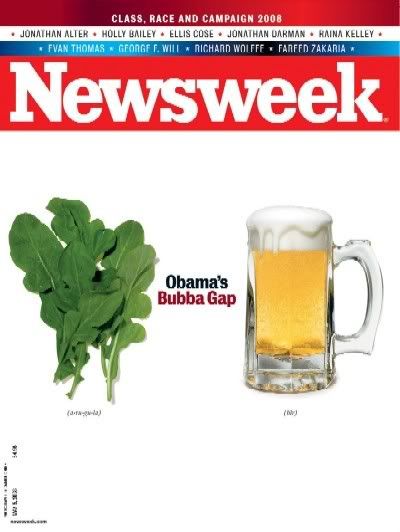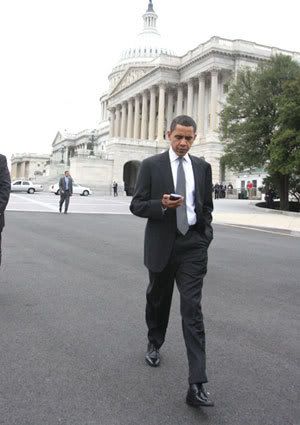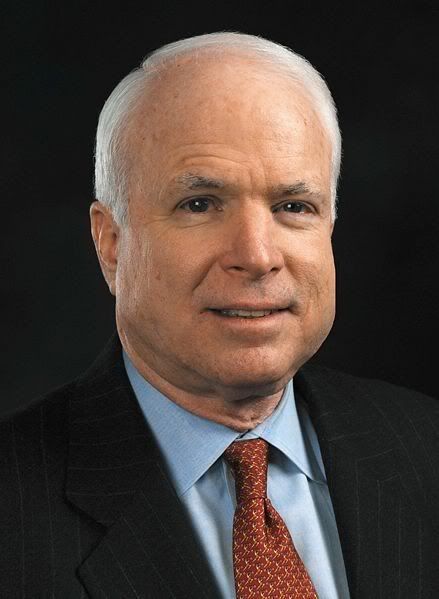NEWSWEEK: Cover: Obama's Bubba Gap

The May 5, 2008 issue of Newsweek (on newsstands Monday, April 28), "Obama's Bubba Gap," examines how Barack Obama's opponents are tapping into Americans' fear of the "other" and painting him as an out-of-touch elitist. The cover package also includes essays on how race and class are playing out on the campaign trail. Plus: Bill Clinton's gaffes; a Texas town's fight against the proposed border fence; how climate change may wreak havoc on agriculture and the Mother's Day gift guide. (PRNewsFoto/NEWSWEEK) NEW YORK, NY UNITED STATES 04/27/2008
27 Apr 2008 16:25 Africa/Lagos
NEWSWEEK: Cover: Obama's Bubba Gap
Deep Rooted Race and Class Issues are Changing the 'Hope' Election to a 'Fear' Election
Wary of His Wide Appeal, Opponents are Painting Obama as an Out-of-Touch 'Elitist'
NEW YORK, April 27 /PRNewswire/ --
There was a time, not so long ago, when the advisers to John McCain worried about running against Barack Obama, who seemed to have a kind of transcendent power, an ability to convince voters that he was not just another politician. In the May 5 Newsweek cover package "Obama's Bubba Gap" (on newsstands Monday, April 28), Editor-At-Large Evan Thomas, White House Correspondent Holly Bailey and Senior White House Correspondent Richard Wolffe report on why and how Obama's opponents are now tapping into American's fears of the "other" and painting Obama as an out-of- touch elitist, who nibbles daintily at designer salads while the working man, worried about layoffs at the plant, belts another shot.

Senator Barack Obama
(Photo: http://www.newscom.com/cgi-bin/prnh/20080427/NYSU004 )
Americans do not like to talk about class, and they want to believe racism is a thing of the past. We want our presidents to be everyman (or every woman), of the people for all the people. The most successful presidents have always been open and hopeful, sunny and optimistic about the promise of American equality and opportunity. But there has long been a dark side to democratic politics, a willingness to play on prejudice, to get men and women to vote their fears and not their hopes. Those prejudices fade and seem to die down, but they never quite go away. They remain embers for cunning political operatives to fan into flames.
In a new Newsweek Poll, 19 percent of American voters say that the country is not ready to elect an African-American president. Yet when asked if Barack Obama's race makes a difference, only 3 percent of whites say his race makes it less likely they would support him, while 5 percent of whites (and 16 percent of non-whites) say his race would make it more likely they would support him. In the Newsweek Poll, more than half the voters said they think "most" (12 percent) or "some" (41 percent) of the voters will "have reservations about voting for a black candidate that they are not willing to express." In close elections, decided on the margins, it is discouraging to think that a small minority of racists could make the difference.
To pockets of America, Obama still seems to be the "other." He seems a little strange, exotic; those cracked e-mails whispering about his middle name (Hussein) and declaring, fictitiously, that he is a Muslim who insisted on being sworn into office on the Qur'an rather than the Bible, keep buzzing around the Internet. To some, his manner is haughty; he is a bit of an egghead, one of those pointy-headed intellectuals whom George W. Bush liked to ridicule as a Deke brother at Yale and even later as president of the United States.
In the Newsweek Poll, 13 percent reported that Obama is Muslim. Newsweek reporters on the campaign trail could hear the wariness, even fearfulness, of voters as they spoke about Obama. Secretly taped by a "citizen journalist," then reported online, Obama's remarks to San Francisco fund-raisers-that some voters in economically depressed towns "cling" to religion and guns out of "bitterness" -- did not sit well, nor did the endlessly replayed YouTube videos of Obama's former pastor, the Rev. Jeremiah Wright Jr., ranting against America. Richard Vallejo, 65, of Bristol, Pa., a typical working-class town, has voted Democratic all his life. But of Obama, Vallejo says: "He's prejudiced against white people. I'm in a small town and if I own a gun, it's not because I'm bitter. It is because of the Second Amendment, the right to bear arms."
Hillary Clinton has described Obama's remarks about small-town bitterness as "elitist, out of touch and frankly patronizing." Clinton strategist Harold Ickes tells Newsweek "she clearly has established a connection with people who work hard for a living and are having difficulty making ends meet." One Clinton ad, featuring a waitress in a diner, says, "She's worked the night shift, too" (never mind that she is a graduate of Wellesley and Yale Law). McCain's advisers, meanwhile, have enjoyed watching Clinton attack Obama over his remarks. "Manna from heaven," said one McCain aide, who did not wish to be identified gloating. Come the fall campaign, GOP operatives can be counted on to caricature Obama as a gutter-ball-throwing populist phony who is far more at home in a sherry-sipping faculty club than at a bowling alley.

Senator Hillary Rodham Clinton

Senator John McCain
Also in the cover package:
Senior Editor and Columnist Jonathan Alter writes that a President Barack Hussein Obama would pose a shock to the country's system. "Opposition to him is not so much old-fashioned racism as fear of the 'other,' with the subtext not just our tortured racial history, but tangled views of class and patriotism ... Fortunately for him, different strains of the American character often work to ease our anxieties: openness, optimism, hope."
Contributing Editor Ellis Cose writes that the surprise in the Pennsylvania Democratic primary was that recent events had virtually no effect on the result. "Barack Obama and Hillary Clinton could have stayed home for the past month and a half and the outcome would have been essentially the same. Women and older voters, for the most part, would have come out for Clinton; blacks, young people and the highly educated elite would have backed Obama." Cose adds that while this is good news for Obama in the short term, it "might be fatal later. Demographics don't necessarily favor him, or any Democrat, in the general election."
Associate Editor Raina Kelley writes that "the idea that the black candidate is successfully being portrayed as an elitist by the two white candidates is priceless, and may be the truest indicator of how far African- Americans have come since the assassination of Dr. Martin Luther King Jr. 40 years ago," she writes. "If Obama seems alien, it may not be simply because he's the African-American presidential front runner, but because he's an African-American politician who doesn't flaunt his scars...As he says again and again in speeches, only in this country would his story be possible."
(Read cover story at www.Newsweek.com)
Cover: Obama's Bubba Gap
Jonathan Alter: Hope vs. Fear
Ellis Cose: McCain's Hidden Advantage
Raina Kelley: An Unfamiliar Narrative
Photo: NewsCom: http://www.newscom.com/cgi-bin/prnh/20080427/NYSU004
AP Archive: http://photoarchive.ap.org/
AP PhotoExpress Network: PRN1
PRN Photo Desk, photodesk@prnewswire.com
Source: Newsweek
CONTACT: Brenda Velez of Newsweek, +1-212-445-4078
Web site: Newsweek

Comments